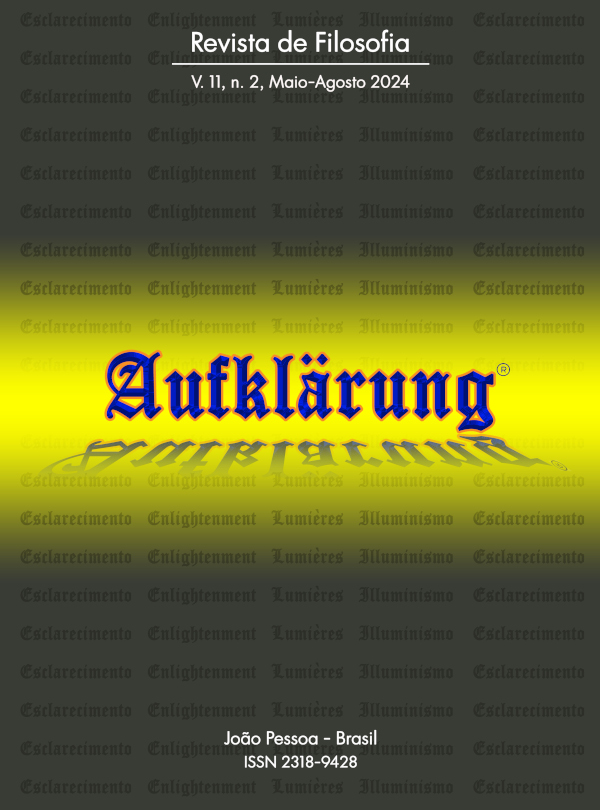The destination of the erudite in Fichte
DOI:
https://doi.org/10.18012/arf.v11i2.70185Keywords:
Fichte, Erudite, Moral, EthicsAbstract
This article aims to examine Johann Gottlieb Fichte's lectures on the destination of the erudite, in particular his contributions to thinking about ethics. In this writing, the philosopher makes a series of reflections on the role of each individual in society, and states that each one has a vocation to be freely chosen, and therefore exercised. Since human beings are essentially dignified, they are allowed to use only things and not their fellow human beings: as a result, they are their own ends. The erudite, in particular, has the vocation to contribute directly to the ultimate goal of the human being, and this goal includes the moral improvement of each individual who makes up society.
Downloads
References
BARBOSA, Ricardo. O destino do erudito. In: FICHTE, Johann Gottlieb. O destino do erudito/ Johann Gottlieb Fichte. Organização e tradução de Ricardo Barbosa. - São Paulo: Hedra, 2014.
BARBOSA, Ricardo. Educação moral ou educação estética? Sobre Schiller e Fichte. Pensando – Revista de Filosofia Vol. 8, nº 16, 2017.
BENJAMIN, Andrew. La démocratie et l'université. Notes sur les “Vorlesungen über die Bestimmung des Gelehrten” de Fichte. In: Revue Philosophique de Louvain. Troisième série, tome 111, n°2, pp. 267-282, 2013.
CARVALHO, Guilherme Felipe; JESUS, Ezequiel B. B. de. Pressupostos para uma educação moral em Kant e Fichte: dos cuidados com a criança ao papel do erudito. Revista Periagoge, Brasília, v. 6. n. 1., 2023.
CESA, Claudio. Introduzione a Fichte. Roma: Gius. Laterza & Figli, 1994.
DRILO, Kazimir. Offenbarung und Realität des Wissens bei Fichte. In: Fichte-Studien, Vol. 33: S. 189-205, 2009.
IVALDO, Marco. Fichte. Tradução de Alessandra Siedschlag. São Paulo: Ideias & Letras, 2016.
FICHTE, Johann Gottlieb. Einige Vorlesungen über die Bestimmung des Gelehrten. Johann Gottlieb Fichtes sämmtliche Werke. Band 6, Berlin 1845/1846. Herausgegeben: Fichte, De Gruyte, 1965.
FICHTE, Johann Gottlieb. Grundlage der gesammten Wissenschaftslehre. In: Fichtes Werke (FW). Ed. I.H. Fichte. Band I. Berlin: Walter de Gruyter, 1971.
FICHTE, Johann Gottlieb. Über den Begriff der Wissenschaftslehre. In: FichtesWerke (FW). Ed. I.H. Fichte. Band I. Berlin: Walter de Gruyter, 1971.
FICHTE, Johann Gottlieb. Foundations of Transcendental Philosophy (Wissenschaftslehre) nova-methodo (1796/99). Edited and translated by Daniel Breazeale, Ithaca and London, Cornell University Press, 1992.
GASPAR, Francisco Prata. A distância do olhar. Síntese e liberdade na doutrina da ciência de Fichte. 2015, 323 f. Tese de Doutorado- Faculdade de Filosofia, Letras e Ciências Humanas. Universidade de São Paulo, São Paulo, 2015.
GAUDIO, Mariano Lucas. El concepto de Estado en el Fundamento del derecho natural de Fichte. Revista Anales del Seminario de Historia de la Filosofía. 36 (2), 383-406, 2019.
HUSSERL, Edmund. (Husserliana XXV) Fichtes Menschheitsideal. In: Aufsätze und Vorträge (1911-1921). Dordrecht, Martinus Nijhoff Publishers, 1987.
KANT, Immanuel. (AAIV) Grundlegung zur Metaphysik der Sitten. In: Kants Werke. Ed. Königlich Preußischen Akademie der Wissenschaften, Berlin: Georg Reimer, 1912.
KANT, Immanuel. (AAV) Kritik der praktischen Vernunft. In: Kants Werke. Ed. Königlich Preußischen Akademie der Wissenschaften, Berlin: Georg Reimer, 1912.
KANT, Immanuel. (AAVI) Die Religion innerhalb der Grenzen der bloßen Vernunft. Mit einer Einleitung und Anmerkungen herausgegeben von Bettina Stangneth, Felix Meiner Verlag: Hamburg, 2003.
Additional Files
Published
How to Cite
Issue
Section
License

This work is licensed under a Creative Commons Attribution 4.0 International License.
Journal general policy
1.This journal works under a Creative Commons License aplied to online journals. That icence can be read in the following link: Creative Commons Attribution 4.0 International (CC BY 4.0).
2.Accordingly to this License, a)the journal declares that authors hold the copyright of their articles without restrictions, and they can archieve them as post-print elsewhere. b)the journal allow the author(s) to retain publishing rights without restrictions.
Metadata Policy for information describing items in the repository
1. Anyone may access the metadata free of charge at anytime.
2.The metadata may be re-used in any medium without prior permission, even commercial purposes provided the OAI Identifier or a link to the original metadata record are given, under the terms of a CC BY license refered for the Journal.







































